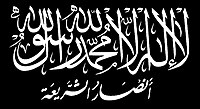| Ansar al-Sharia in Libya | |
|---|---|
| أنصار الشريعة بليبيا | |
 | |
| Leaders | Abu Khalid al Madani[1] Mohamed al-Zahawi †[2] |
| Dates of operation | June 2012 – 27 May 2017[3][4][5] |
| Allegiance | |
| Active regions | Benghazi[7] Other cities in Eastern Libya[8] |
| Ideology | Islamism Salafi jihadism Anti-Gaddafism |
| Size | 4,500–5,000+[9] |
| Part of | Ansar al-Sharia Shura Council of Benghazi Revolutionaries Ajdabiya Shura Council |
| Allies | |
| Opponents | Al-Saiqa (Libya) Operation Dignity coalition |
| Battles and wars | First Libyan Civil War |
| Designated as a terrorist group by | |
Ansar al-Sharia in Libya (ASL, Arabic: أنصار الشريعة بليبيا, lit. 'Supporters of Sharia') was an Al-Qaeda-aligned Salafi Jihadist militia group that advocated the implementation of Sharia across Libya.[3] Ansar al-Sharia came into being in 2011, during the Libyan Civil War.[12] Until January 2015, it was led by its "Amir", Muhammad al-Zahawi.[2] As part of its strategy, the organization targeted specific Libyan and American civilians for death and took part in the 2012 Benghazi attack.[12] The group was designated as a terrorist organization by the United Nations,[13] Iraq,[14] Turkey, the United Arab Emirates, the United Kingdom[15] and the United States.[12]
On 27 May 2017, the group announced it was formally dissolving itself, amid heavy losses that killed most of its leadership and decimated its fighters.[5]

- ^ "Ansar al Sharia Libya fights on under new leader". The Long War Journal. 30 June 2015. Archived from the original on 1 July 2015. Retrieved 2 July 2015.
- ^ a b "Leader of Libyan Islamists Ansar al-Sharia dies of wounds". Reuters. 23 January 2015. Archived from the original on 3 April 2015. Retrieved 13 March 2015.
- ^ a b c "Profile: Libya's Ansar al-Sharia". BBC News. 13 June 2014. Archived from the original on 24 August 2014. Retrieved 12 August 2014.
- ^ "Libya militia linked to U.S. attack returns to Benghazi". Reuters. 17 February 2013. Archived from the original on 26 October 2014. Retrieved 10 January 2014.
- ^ a b "Libyan Islamist group Ansar al-Sharia says it is dissolving". Reuters. 27 May 2017. Archived from the original on 28 May 2017.
- ^ "Many Jihadi Groups In Asia & Africa Pledge Allegiance To Taliban Leader, Group Sources". 9 October 2024.
- ^ "US names groups suspected of Benghazi attack". Al Jazeera English. 10 January 2014. Archived from the original on 7 June 2015. Retrieved 23 January 2015.
- ^ Cite error: The named reference
fp200114was invoked but never defined (see the help page). - ^ Michael, Maggie; Hendawi, Hamza (18 September 2012). "A Benghazi power, Libya militia eyed in attack". Associated Press. Archived from the original on 21 September 2012.
- ^ Cite error: The named reference
jamestown9Janwas invoked but never defined (see the help page). - ^ McGregor, Andrew (8 August 2014). "Libya's Ansar al-Shari'a Declares the Islamic Emirate of Benghazi". Terrorism Monitor. 12 (16). The Jamestown Foundation. Archived from the original on 6 January 2015. Retrieved 10 August 2014.
- ^ a b c Office of the Spokesperson (10 January 2014). "Terrorist Designations of Three Ansar al-Shari'a Organizations and Leaders". U.S. Department of State. Archived from the original on 21 January 2017. Retrieved 7 August 2014.
- ^ "The List established and maintained by the Al-Qaida Sanctions Committee with respect to individuals, groups, undertakings and other entities associated with Al-Qaida". United Nations Security Council Committee 1267. UN.org. 19 November 2014. Archived from the original on 25 September 2014. Retrieved 21 November 2014.
- ^ الموضوع Archived 14 May 2022 at the Wayback Machine moj.gov.iq (in Arabic)
- ^ "Proscribed terrorist groups or organisations". Home Office. 15 July 2016. Archived from the original on 26 September 2016. Retrieved 27 September 2016.